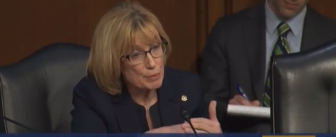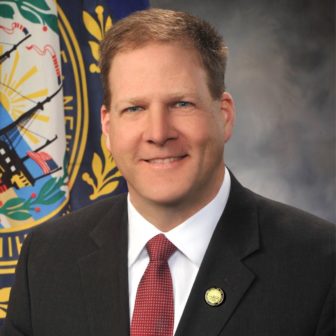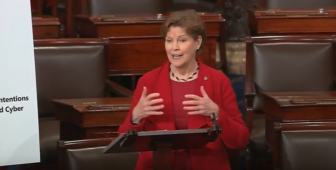By GARRY RAYNO, Distant Dome
On Gov. Chris Sununu’s official website is an announcement seeking middle and high school females to apply to be governor for a day.

Molly Robert
The competition had 100 contestants and the winner is Molly Robert, senior class president of Kennett High School in Conway.
She is expected to exercise her new-found power this Wednesday.
The competition coincided with Women’s History Month in March.
New Hampshire has had three women governors. Former Govs. Jeanne Shaheen and Maggie Hassan — now both US senators — were elected to the state’s highest office. The late Vesta Roy was Senate President and became governor when former Gov. Hugh Gallen died in office. She served from Dec. 29, 1982 to Jan. 6, 1983.
Two were Democrats — Shaheen and Hassan — and Roy was a Republican.

Garry Rayno
Other female Senate Presidents have been acting governor when the governor is out of state: Bev Hollingworth, Sylvia Larsen and Roy. The House’s two female speakers, Donna Sytek and Terie Norelli, may have been as well if both the governor and Senate President were both out of state.
But that is about it for women in the corner office.
And communications being what they are these days with the governor reachable almost anywhere really takes away any semblance of power for an acting governor. A state police escort to an event is probably the biggest perk.
Both Shaheen and Hassan were popular governors. Shaheen left the corner office to run for US Senate but lost in a close election to John E. Sununu, only to defeat him in a close race six years later.

YouTube
U.S. Sen. Maggie Hassan, D-NH
Hassan defeated first-term former Attorney General Kelly Ayotte in the 2016 election.
Shaheen and Hassan could probably tell Molly Robert that politics is politics no matter your gender but that both helped to lead the struggle to bring more and more women into key positions in New Hampshire state government.
More women have served on the State Supreme Court since Shaheen, women have lead the Department of Transportation, been the state’s chief administrator as Commissioner of Administrative Services and held numerous other key posts like Department of Education Commissioner.
But still most top positions in New Hampshire state government are held by men and it’s a long journey to reach parity.
Being governor for a day will be an informative experience for Molly Robert who may learn how little power New Hampshire governors really have beyond the bully pulpit.
Two-tear term
New Hampshire is one of two state that have two-year terms for governor, the other Vermont.

Kelly Ayotte
The architects of New Hampshire government wanted their chief executives to have limited power and made the governor’s term the same as members of the House and Senate.
In today’s world of constant campaigns, there is little room for longterm projects or to take care of controversial issues early in your term as other governors can do hoping the public forgets when you run again four years later.
Governors often inherit the last governor’s department heads which can be very problematic if the governor is a member of the other party.

Former Gov. John Lynch
Former Gov. John Lynch inherited Health and Human Services Commissioner John Stephen who was appointed by former Gov. Craig Benson.
Stephen continued his efforts to reform the department, while seeking national notice and eventually ran unsuccessfully against Lynch for governor.
Lynch also inherited Ayotte as Attorney General but reappointed her to the position before she left to run for US Senate.
Executive restriction
The biggest restriction for a governor, however, is the five-member Executive Council, a remnant of Colonial times.
The council has to approve all key appointments like commissioners, deputy commissioners, judges and many division heads as well as to the many boards advising and overseeing state agencies.
The Council also approves all state contracts over $75,000, from painting the visitors center at Franconia State Park to the $2 billion Medical Managed Care contract.

Donna Sytek
Sununu last week vetoed a bill that would have raised the threshold to $150,000. He was not in favor of the last increase which occurred when he was the District 3 Executive Councilor and Hassan was governor.
The most recent redistricting of executive council seats created three very Republican districts, one extremely Democratic district and one that could go either way.
Since that time, Republicans have held a majority with a Democratic governor deciding the agenda for all but the last two years.
Lynch worked with the council in a bipartisan way often finding the three votes he needed while Hassan had a more partisan approach, And much like Shaheen’s last term with her eye on a US Senate seat, the Republicans on the council and in the legislature did their best not to give them any victories to take to the voters in the next general election.
Governors work with legislators in different ways as well. The bully pulpit of public opinion is a favorite tool but often can backfire when the legislature is controlled by Republicans and the governor is a Democrat.

Gov. Chris Sununu, R-NH
Sununu, like his father, is working with a Republican-controlled legislature, and while that produced some long-sought GOP goals such as tightening voter residency requirements, lowering business taxes and reducing regulations, it has not produced some of the governor’s priorities like right-to-work and school vouchers.
Word was Sununu pushed the Senate to add the school voucher amendment to a bill during the final days of this session giving it one more chance.
While he may have won the day in the Senate, Sununu lost the war when the House voted the provision down for the third time in two weeks.
Relations the last two years were generally cordial between the first-term governor and the GOP legislature.
That was not the case with the last GOP governor Craig Benson who often warred with the GOP legislature resulting in a memorable two years for the New Hampshire media, but little was accomplished.
Benson vetoed the Republican’s two-year budget and House and Senate leaders took turns blasting him for it in daily press conferences outside his door in the Executive Council Chambers. There was little improvement the next year and Benson was defeated by Lynch after one term.

U.S. Sen Jeanne Shaheen, D-NH.
Lynch, much like Shaheen, worked successfully with GOP legislatures. One term Shaheen had a Democratic Senate to work with, while two of Lynch’s four terms were with Democratically controlled legislatures.
Lynch’s final term was a different story. That 2010 election was a GOP landslide and gave Republicans 75 percent of the House and Senate seats meaning any Lynch veto was easily overridden and frequently was. One result was the stand-your-ground law, a budget that slashed state aid to higher education and eliminated many social service programs such as CHINS (Children in Need of Services).
The state is is still trying to overcome the damage those cuts made for example to the Division for Children, Youth and Family, which is struggling to rebuild.
Hassan had a more confrontational approach, although her first term she had a Democratically controlled House to act as her advocate. Signing the law expanding Medicaid under the Affordable Care Act was her biggest accomplishment her first term.
Over her two terms, she and lawmakers agreed more had to be done to fight the state’s opioid abuse epidemic but often fought over how to accomplish that and who should receive the credit.
The approach
Governors approach the job differently. Benson and Lynch had been successful CEOs before running for governor but their approaches were polar opposites.
What a governor accomplishes while in office depends on many things, but certainly the legislature and executive council have a large say as does the state bureaucracy and the state’s economy.
The limitations built in by the state constitution put a damper on any governor’s accomplishments over four, six or eight years.
In any one day, what a governor accomplishes has far more to do with his or her effect on the people he or she interacts with speaking to a local Rotary Club or touring a manufacturing facility.
That interaction does more to drive a governor’s polling numbers than what she or he does in the State House.
If Sununu treats Molly Robert to a typical day as the state’s chief executive, she should see both worlds, inside and outside the State House.
Molly keep your ideals high, but your expectations low. The founding fathers did not want governors exercising too much power.
Garry Rayno can be reached at garry.rayno@yahoo.com
Distant Dome by veteran journalist Garry Rayno explores a broader perspective on the State House and state happenings. Over his three-decade career, Rayno covered the NH State House for the New Hampshire Union Leader and Foster’s Daily Democrat. During his career, his coverage spanned the news spectrum, from local planning, school and select boards, to national issues such as electric industry deregulation and Presidential primaries. Rayno lives with his wife Carolyn in New London.





